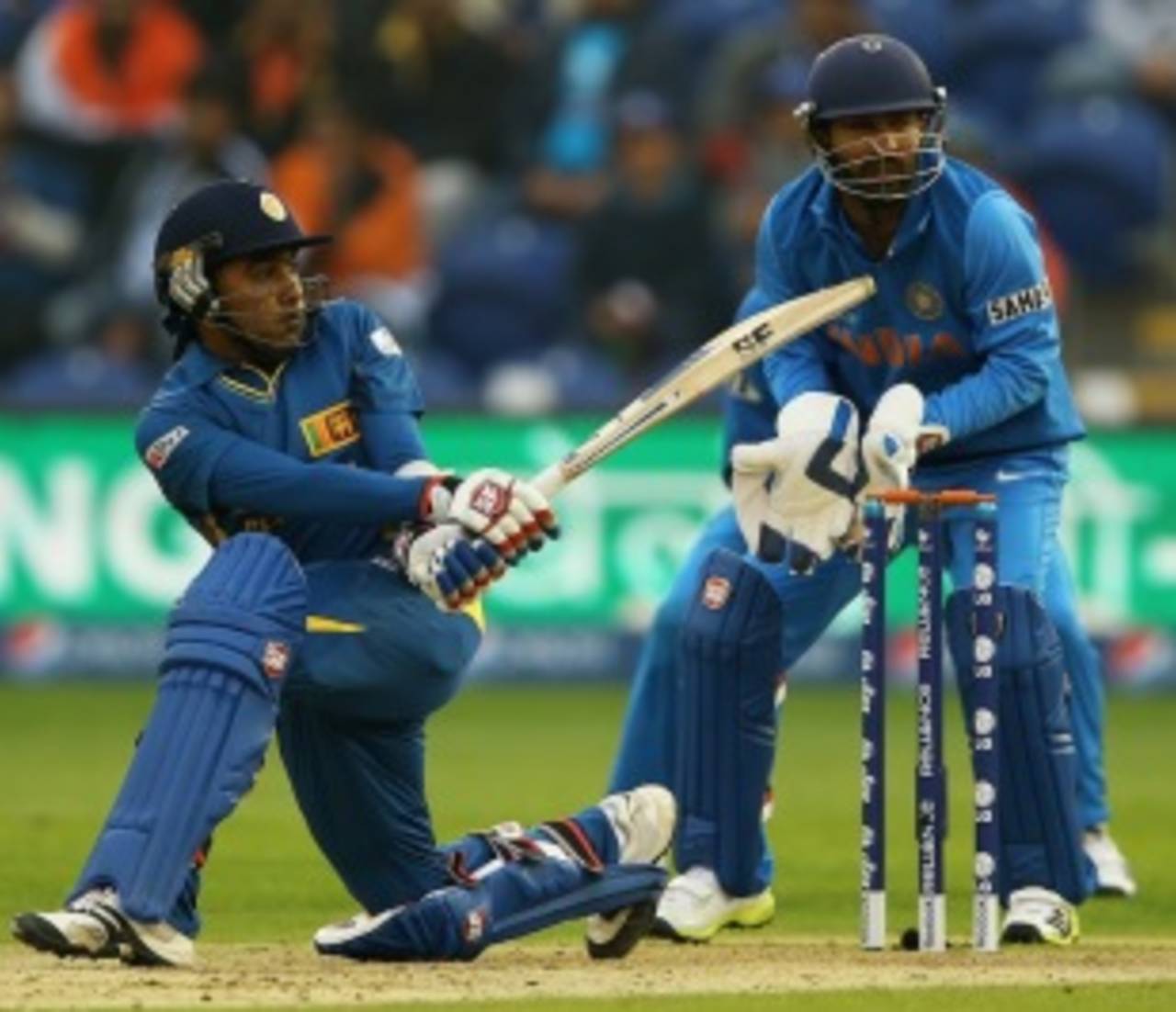Fair result for a middling ODI team
Fight carries Sri Lanka far into tournaments, but they lack the ruthless edge that winning titles requires
Andrew Fidel Fernando in Cardiff
Jun 20, 2013, 9:37 PM

Sri Lanka's waning middle order came to the fray this tournament • ICC/Getty
Sri Lanka have made for pretty bridesmaids in recent years. They have known, in past campaigns, how to make the most of their assets - the big players have fired and the team has played a very watchable brand of cricket.
This time, they encountered the team of the competition in the semi-finals, which has not always been the case in the past, and were thus relegated one step further in the tournament hierarchy. In the UK, Sri Lanka will be the friends watching jealously as someone else gets to be ogled at for a bit, precede the winner gracefully to the stage, and then cry themselves to sleep wondering when it will ever be their big day.
After the match Angelo Mathews casually threw out the phrase "we choked", which in cricket once carried a taboo to match attitudes towards cannibalism, but is now in vogue for exiting teams like it had been labelled the season's "in" response in Press Conference magazine. Soon after he had uttered the phrase, Mathews backtracked by stating a psychological meltdown did not contribute to their demise, and perhaps he was correct in that revised assessment.
Like South Africa in the first semi-final, Sri Lanka were never in a good enough position to choke. It has been a feature of this campaign, and several before it, that Sri Lanka have played hard, competitive cricket, but have rarely dominated foes as champions do.
The narrow loss to New Zealand in Cardiff may have been a boon to team morale, but a side that folds for 138 on a pitch that warrants a score in excess of 230 are not worthy of taking home a trophy, despite their ability to regroup and surge. The never-say-die spirit in their performance makes them a compelling team to watch, and their group matches provided the most thrills of the Champions Trophy. But a better team would not have allowed such anxiety to creep in.
When Australia were at 192 for 9, chasing 254, Sri Lanka should have brought the field in and pushed hard for the final wicket, but instead they waited for Clint McKay and Xavier Doherty to make the mistake, and gave the opposition a sight of victory they never should have been afforded. Fight carries Sri Lanka far into tournaments, but they lack the ruthless edge that winning titles requires.
As was expected before the competition began, Sri Lanka have also relied heavily on their experienced batsmen, and the remainder of their lengthy batting order have provided nothing more than support. Sri Lanka's transitioning status will make the exit palatable to fans at home, but Mathews, Dinesh Chandimal and Lahiru Thirimanne have far to go before they are capable of consistently carrying ODI innings without the aid of the senior batsmen.
The decision to promote Nuwan Kulasekara against England proved to be a fine one, but Mathews prides himself as a finisher, and a captain more confident in his own ability may not have deferred the task. His final innings, at least, has proved he has not grown averse to pressure. As a tactician, he can perhaps count this tournament as a positive learning experience.
Apart from last year's World Twenty20 final defeat to West Indies, when mental frailty might have played a substantial role, Sri Lanka were outplayed by a stronger opposition in each of the finals before it. In 2007, Australia were even more dominant through their campaign than India have been in this tournament, and an Adam Gilchrist blitz effectively put his side out of Sri Lanka's reach in the first quarter of that match. In 2009, Mohammad Amir and Abul Razzak's early strikes did the same in a World T20 final, and in 2011, MS Dhoni and company dominated Sri Lanka's bowling to make 275 seem a cakewalk. It seems odd that they have not converted one of their six semi-finals positions, but rarely have they seemed likely winners from a tournament's outset.
"It's very tough to go head to head with India," Mathews said. "You need to gear up all the time. You can't really take your foot off the pedal. They've been unbeaten so far and they play a brand of cricket that they're good at."
Mahela Jayawardene and Kumar Sangakkara now have, at most, two more opportunities to taste major limited-overs glory. If either retires without a world title to call his own, it will be among the greater injustices of Sri Lanka's cricket history. For the stalwarts to earn that prize there is much improvement to be made across the team and a killer instinct yet to be acquired. But for now, a semi-final exit is a fair result for a middling ODI team.
Andrew Fidel Fernando is ESPNcricinfo's Sri Lanka correspondent. He tweets here